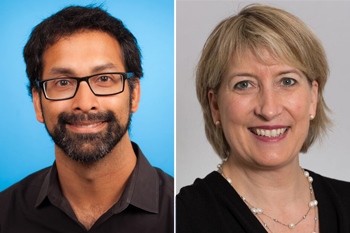Urban health training: Unique course offers new perspective

By Ana Gajic

Drs. Andrew Pinto and Katherine Rouleau
One course in particular sticks out in Leanna McCarney’s memory from her training as a social worker at St. Michael’s Hospital.
It was the Urban Health Elective, piloted for one year and offered to learners in a variety of disciplines at St. Michael’s. The interprofessional elective course focused on the social determinants of health, which are social aspects that influence health care (such as housing, socioeconomic status, etc.).
“Through the course, we met individuals who faced issues relating to various social determinants of health, such as refugees and young people who were homeless,” McCarney said. “Not only did I find hearing their stories and experiences to be powerful, but the course also allowed me with an opportunity to work through tasks and interact with students from different professions.”
The elective was developed by Dr. Andrew Pinto, a family physician and researcher in The Upstream Lab at the Centre for Urban Health Solutions (C-UHS) of St. Michael’s, and Dr. Katherine Rouleau, a family physician at St. Michael’s. Supported by the St. Michael’s Hospital Foundation, the course’s aim was to build inner-city curriculum as part of the strategic plan at the time.
The pilot course ran throughout the academic year and enrolled 17 students from eight disciplines, most from the University of Toronto and Ryerson University, who were already training at St. Michael’s. An account of the course was published in the Canadian Medical Education Journal.
“Cities are increasingly home to large numbers of people who have been made vulnerable by political and economic systems,” Dr. Pinto said. “You have an intersection of the context with people’s health. People may be exposed to issues like entrenched poverty, interpersonal violence or air pollution in the inner city but at the same time there are many resources. So, we set out to teach how providers could identify these issues, link people to resources, and be part of solutions.”
Community partners and community members with lived experiences in the topic areas co-facilitated the course sessions. The topics covered included housing, income and food security, Indigenous communities in urban spaces and advocacy. Community agencies such as shelters, Indigenous health centres, food centres, agencies that help people access care, and harm reduction services participated in the course.
In addition to showing students a new perspective on the social determinants of health and what they could offer to those in need, the course was unique in its structure, said Dr. Rouleau.
“Different disciplines not only learned alongside each other, but also tackled and listened to the realities of poverty and disadvantage from the different perspectives they brought from their own fields,” she said. “It highlights the fact that addressing adverse social determinants of health is really everybody’s business.”
One of the goals of the course, Dr. Pinto explained, was to show health providers that they can speak up on policy changes that affect the populations they serve.
“I hope learners took away in-depth knowledge about how the determinants impact on people and what providers can do,” he said.
For McCarney, who now works at the Ottawa Hospital, it solidified a career of interdisciplinary teamwork and understanding of different life experiences.
“It opened up productive discussions and dialogues around the social determinants of health which broadened my own understanding and knowledge around this topic,” she said.
Though the course was only offered for one year, curriculum at St. Michael’s has continued to evolve.
“Current educational initiatives include a longitudinal family medicine clerkship program that encourages students to engage in advocacy,” said Dr. Pinto.
“This is our hope for the future – that we’re effectively training future health providers to work in teams to tackle the root causes of poor health.”
About St. Michael’s Hospital
St. Michael’s Hospital provides compassionate care to all who enter its doors. The hospital also provides outstanding medical education to future health care professionals in more than 29 academic disciplines. Critical care and trauma, heart disease, neurosurgery, diabetes, cancer care, care of the homeless and global health are among the Hospital’s recognized areas of expertise. Through the Keenan Research Centre and the Li Ka Shing International Healthcare Education Centre, which make up the Li Ka Shing Knowledge Institute, research and education at St. Michael’s Hospital are recognized and make an impact around the world. Founded in 1892, the hospital is fully affiliated with the University of Toronto.
About Unity Health Toronto
Unity Health Toronto, comprised of Providence Healthcare, St. Joseph’s Health Centre and St. Michael’s Hospital, works to advance the health of everyone in our urban communities and beyond. Our health network serves patients, residents and clients across the full spectrum of care, spanning primary care, secondary community care, tertiary and quaternary care services to post-acute through rehabilitation, palliative care and long-term care, while investing in world-class research and education. For more information, visit www.unityhealth.to.
